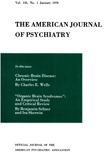Abstract
Merely doing fundamental neurological evaluation and giving neurosurgical consideration, then assigning patients to physiotherapy and reconditioning do not effect understanding or sufficient therapy for men with brain damage. Groping for reintegration, these wounded personalities must be considered as a special group needing stimulation and direction. They and those who work with them must be given healthy, reasonably optimistic conceptions and plans. Feelings of hope, usefulness and of being restored to the community as respected adults must be instilled.
Old concepts of organic dementia and deterioration are not strictly applicable to these men, even those most severely injured. They are young, and their brains are healthy. We are struck by an inherent force of restitution, stabilization and improvement, but we have found that it needs stimulation and direction. The deficits of these men need not as yet be regarded as permanent, static, and least of all progressive. Many possibilities exist for re-education, restoration and healthy adjustment. Although oversimplified and unproven, the theory that there is a reserve of cerebral neurons which can be reeducated is a helpful concept. The human personality is versatile in its ability to adjust with losses and to losses.
We have felt that our efforts were amply rewarded by the progress these men made. Physical strength and agility reappeared as did handwriting, reading, spelling, mood stability, poise and self-confidence. The triplegic walked with a cane; the hemiplegic drove his father's tractor. They felt useful again and could plan now for the next 25 to 50 years. They had an understanding about themselves that was wholesome.
Of 64 severely injured patients (as described), only 4 had to be institutionalized, 3 for severe physical helplessness (triplegias, extensive cerebellar damage) and 1 for intellectual deficiency. The remaining 60 were discharged, ambulatory and confident, directly to their homes.
We do not intend to be carried away by optimism, for we shall never rehabilitate most of these men to where they will be entirely self-sufficient, steadily employed, or "as good a man as before." However, we saw no patient for whom immediate, simple relegation to institutional care was necessary. We saw no case in which such a pessimistic disposition was warranted. We saw no man for whom a great deal could not be done in the way of active restoration and rehabilitation. Such viewpoint, however, has necessitated vigor and healthy optimism directed toward understanding these men as individuals and individuals adjusting to certain losses and experiences. It has necessitated keeping them busy socially, mentally and physically. It has necessitated steering clear of, and fighting, invalidism, apathy, stagnation and neurotic adjustments to a handicap, conditions to which men with head injuries are very susceptible.
We have learned that it means little to save a life, to cover a skull defect, and to give a man veterans' compensation if the adjustment and reintegration of that individual are neglected. The job is only half done if he is merely diagnosed and labeled, routinely assigned to this or that program, sent to physiotherapy and occupational therapy in isolated fashion, and then disposed of as a pathetic product of war to his home or to drab institutional care. The wounds are fresh and the patient young. We must deal with both now and not 2 or 5 years hence. Let us again seriously consider what constitutes maximum benefit of medical care in these cases.

